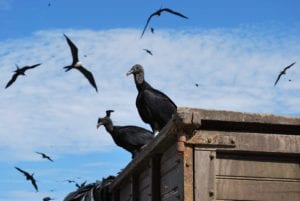Aldina Franco and a team from the University of East Anglia followed the birds and found them eating meat discarded at nearby landfills. Incredibly, the steady supply of food products such as thishas allowed stork populations to increase tenfold since the 1980s.
“The landfill food enables the storks to raise a larger number of chicks per nest,” says Franco. Human intervention The storks are just one of many species shifting their migration patterns because of human behaviour. Also, these birds may soon reroute again: The European Union recently revised landfill rules so that food waste is handled under cover. Hopefully the storks will be able to re-establish old migration patterns. Source: Discover magazine
Easy access to food is luring white storks in Portugal away from their established migration patterns. A journal article in Movement Ecology reveals they’re choosing to feast on landfill garbage instead.
In 1822, a well-placed arrow solved the mystery of why some European birds would vanish after summer and reappear in spring. A hunter in Mecklenburg, Germany, killed a white stork that already had an African projectile lodged in its neck. Nearly two centuries later, European researchers are trying to explain a new phenomenon: “Why have so many storks stopped migrating?”
Garbage storks
Seventeen Portuguese storks were tracked by conservation ecologists using GPS tags through their normal migration period to figure out why.
Instead of heading to sub-Saharan Africa, the birds made regular trips from their permanent nests to landfills dozens of miles away — something previously unheard of.







